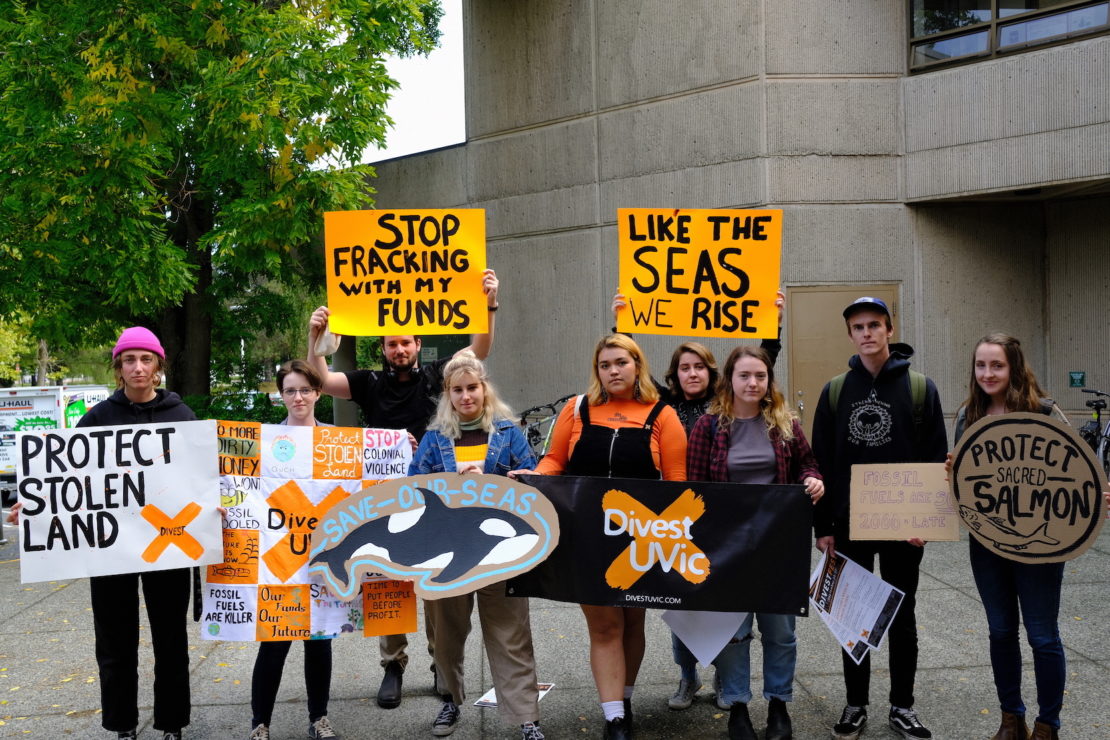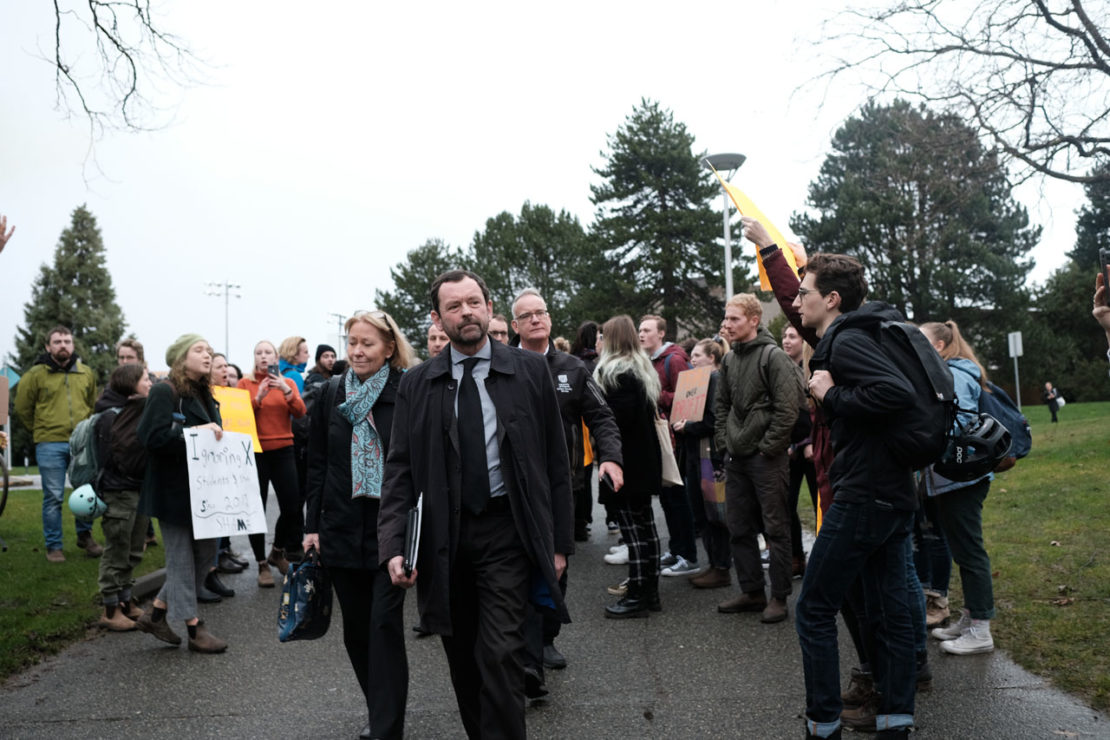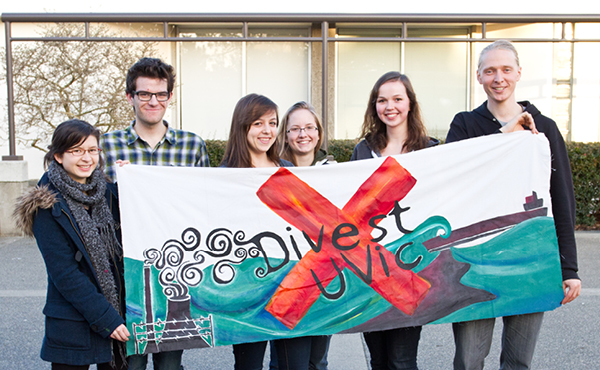$40 million still invested in fossil fuels through UVic Foundation, as of March 2020

The University of Victoria has moved $80 million of their Working Capital Fund into a fossil fuel free fund — meaning the fund no longer has any investments in fossil fuels. Divest UVic, a campus-based advocacy group run by students, faculty, and staff of the university, has been pushing UVic to divest from fossil fuels for eight years.
Emily Lowan, the group’s lead organizer as well as the UVSS Director of Campaigns and Community Relations, says that she is ecstatic.
“This is truly a historic moment for the campaign and for the whole university,” Lowan told the Martlet. “What this tells us is that we have a real opportunity to push for a bold climate justice agenda on campus.”
UVic Treasurer Andrew Coward said in a press release that today’s announcement signals UVic’s dedication to addressing climate change and is in line with the Responsible Investment Policy.
“We are acting on our commitment to address climate change in every domain at UVic including through our investments,” said Coward.
UVic was previously hesitant to divest and instead aimed to reduce the carbon intensity of their portfolio through shifting their investments towards companies that emit less carbon. In the Responsible Investment Policy passed last January, the UVic Board of Governors (BOG) defined carbon intensity as “the estimated overall emissions resulting from every investment in the portfolio combined.” This policy aims to reduce the carbon intensity of UVic’s short-term investments by 45 per cent by 2030. Today’s $80 million divestment will certainly move them closer to this goal.

“The opportunity to invest in renewable power is clear and it aligns with UVic’s responsible investment strategy allowing for support of future technologies while also ensuring a strong financial return,” said Coward. “Investing in the fossil fuel free fund allows us to lower the carbon footprint of our investments which helps to mitigate the investment risk associated with climate change as society transitions to a greener economy that is focused on reducing greenhouse gas emissions.”
The Responsible Investment Policy only applies tothe $225 million Working Capital Fund, however, and does not apply to the $470 million invested through the UVic Foundation.
Lowan says that the next step for Divest is to lobby the UVic Foundation to divest from their fossil-fuel related investments and, in so doing, achieve full divestment at UVic. Lowan estimates that the fund holds $40 million worth of investments in the fossil fuel industry, according to public financial statements released in March 2020.
The UVic Foundation, as a separate entity, is not under the direct control of UVic’s BOG. Several members of the Foundation’s Board, such as President Kevin Hall and Treasurer Andrew Coward, are also members of the BOG.
Whereas the Working Capital Fund makes investments and serves as the internal bank of the university for the purposes of capital projects, such as the building of new student dining and housing facilities, the UVic Foundation is a registered charitable organization that manages UVic’s assets and endowments and provides $15 million a year for scholarships and bursaries given out by the university.
Funding for the foundation comes from endowments granted to the university. The foundation currently has over 1 300 endowments. Funds are then put toward various investments for the purposes of the endowment. The investments themselves are controlled by a variety of third-party investment managers. Although the foundation hasn’t made any promises to reduce their investments in fossil-fuel associated companies, investors have an option to donate to a fossil fuel free fund.
The foundation has gradually moved some of their funds away from the fossil fuel industry since 2017. As of March 2020, only two per cent of the foundations’ $470 million is invested in fossil fuels. Coward said this change was largely to mitigate risk.
Unlike the BOG, the foundation’s board does not open their meetings to the public and makes their decisions behind closed doors.
Lowan says she that as a student representative for the UVSS she will be emailing has email access to the members of the foundation’s board and hopes to lobby them through the publicization of the BOG’s decision to divest the Working Capital Fund. She also says that she hopes to have regular meetings with the board in order to begin a dialogue around divestment.
Alongside the partial divestment, UVic also announced a $10 million investment in the BlackRock Global Renewable Power III Fund. The fund will support 250 renewable power projects that align with the United Nations’ Sustainable Development Goals. Among the projects in BlackRock’s portfolio are an onshore wind farm in Norway and a floating solar farm in Taiwan.
Within the last year, five Canadian universities have committed to divestment including Concordia University, the University of British Columbia, Guelph University and Lakehead University. In September 2020, Divest UVic and 18 other student divestment groups across the country published an open letter calling for all post-secondary institutions in Canada to divest from fossil fuels and invest in a just economic recovery.

Lowan says that she is grateful for the work that all members of Divest have put in over the last eight years and hopes that their work can continue to have an impact.
“I’m just honestly feeling so grateful for all the time and energy, literally thousands of students and faculty members over the past eight years who put their time into this campaign,” she said. “I don’t think without the sustained pressure and persistence of this campaign that we would be celebrating here today.”







